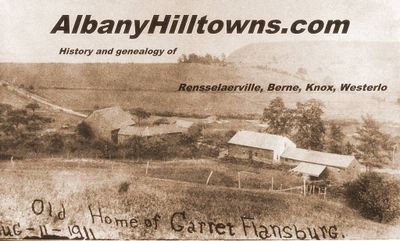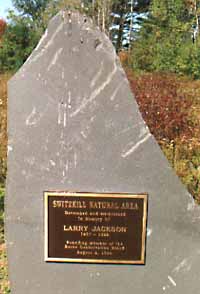Difference between revisions of "Berne"
JElberfeld (talk | contribs) m |
JElberfeld (talk | contribs) m |
||
| Line 81: | Line 81: | ||
== FAMILY HISTORY AND STORIES == | == FAMILY HISTORY AND STORIES == | ||
| − | |||
| − | |||
| − | |||
| − | |||
| − | |||
| − | |||
| − | |||
| − | |||
| − | |||
| − | |||
| − | |||
| − | |||
| − | |||
| − | |||
| − | |||
| − | |||
| − | |||
| − | |||
| − | |||
| − | |||
| − | |||
| − | |||
| − | |||
| − | |||
| − | |||
| − | |||
| − | |||
| − | |||
| − | |||
| − | |||
| − | |||
| − | |||
| − | |||
| − | |||
| − | |||
Revision as of 23:37, 30 September 2012

Berne, one of the four Albany County Hilltowns, is at the west border of Albany County. The other Hilltowns are Knox, Westerlo, and Rensselaerville. The town of Berne (originally spelled "Bern") was created in 1795 from part of the Rensselaerville. In 1822 the north half of Berne was spun off to form the new Town of Knox.According to the United States Census Bureau, the town has a total area of 64.8 square miles. The west town line is the border of Schoharie County, New York.
- Maps - Click the following link to view various Berne maps.
- Census records for the following years have been transcribed and posted on the Berne Historical Project site: 1790, 1800, 1840, 1850, 1855, 1860, 1865, 1865 Additional, 1905, 1915, 1925
Maps
Numerous maps have been found, some dating back 250 years. Click here for more information.
History
Berne's History appears in many publications. Click here for more information.
Military History
From the beginning residents of Berne have served in the military. Click here for more information.
Family Histories and Genealogy
Farms and Lots
Historic Homes
Churches
Hilltown churches formed and often merged, divided, and disbanded, so tracking churches can be a challenge. Click here for more information.
Cemeteries
Hilltown cemeteries range from tiny, hidden family plots to huge cemeteries. Click here for more information.
Schools
Hilltowns had numerous one-room schools scattered to be near population centers. school. In 1932 Berne and Knox joined the form the Berne-Knox Central School District. Westerlo joined later the make the Berne-Knox-Westerlo or BKW. Click here for more information.
Organizations
Hilltown organizations united residents and provided services the made life in the Hilltowns more enjoyable. Click here for more information.
Businesses
Berne businesses thrived for generations. Click here for more information.
Hamlets and Communities
Each of the four Hilltowns covers a large area. Early settlers joined together to create small hamlets, villages, communities, and just groups of houses. Click here for more information.
Photo Gallery
External Links
External Links to other web sites can bring you to valuable sources of information. Click here for more information.
VISITOR ATTRACTIONS AND FACILITIES
Like all of the Albany hill towns, Berne is known for its natural beauty: pastoral rural countryside, rolling hills, meandering creeks, waterfalls, forest land.
- - Berne visitor attractions and facilities including farms, farm activities, natural reserves, trails, historic buildings and cemeteries.
- - Proposals for town of Berne, farmers and businesses to enhance visitor experiences.
- - Making the Hilltowns a Tourist Destination for ideas low impact tourism.
UPCOMING EVENTS
Upcoming events are listed on the following pages:
- Upcoming events for visitors who want to know what is coming up when they "Head for the Hills."
- Upcoming Events of Special Interest to Hill Town Residents
HISTORIC BUILDINGS AND SITES
Historic Building and Sites in Berne
Using as a basis An Inventory of Historic and Scenic Resources In the Town of Berne compiled by Thomas Conklin for the Berne Conservation Advisory Council, 1979
Historic Farms and Lots
Historic Farms
- Berne Lots - The farms are in order by Van Rensselaer Great Lot number which tells approximately (and often precisely) which grid on Beers 1866 map of Berne the farm is located. The lot numbers were assigned by Wm. Cochran when he did the first survey of the Hilltowns in 1786 and 1787.
- Dutch Barns were predominant from the mid-17th century to the early 19th century in the Colony of New Netherland. The New World Dutch Barn is unique among American farm buildings. It’s clean and logical structural system was derived from medieval European timber framing, and the availability of massive timbers from the virgin American forests allowed the barn builders to attain a scale and elegance that we still marvel at today. This was the area first settled by the Dutch and Palatine Germans, what is now northern New Jersey, and the Hudson, Mohawk, and Schoharie Valleys, and western Long Island in New York State. Hundreds of Dutch Barns still survive. Many are well known and have been studied and photographed by members of the Dutch Barn Preservation Society. The Towns of Berne and Knox are fortunate to have a number of Dutch style barns all built over two centuries ago. Whether the carpenters were Dutch, or Germans building in the Dutch style, has yet to be determined. The Dutch Barn Preservation Society has more information on historical importance of Dutch Barns.
- - Jacob Post Barn on Lot 592
- - Mathias Shultes Barn on Lot 575
- - Jacob Post Barn on Lot 592
- Deeds / Leases
Historic Homes
The story of all of the Historic Homes in Berne, and for each when it was built, who lived there, additions, remodeling.
FAMILY HISTORY AND STORIES
Numer of pages: 3,742
